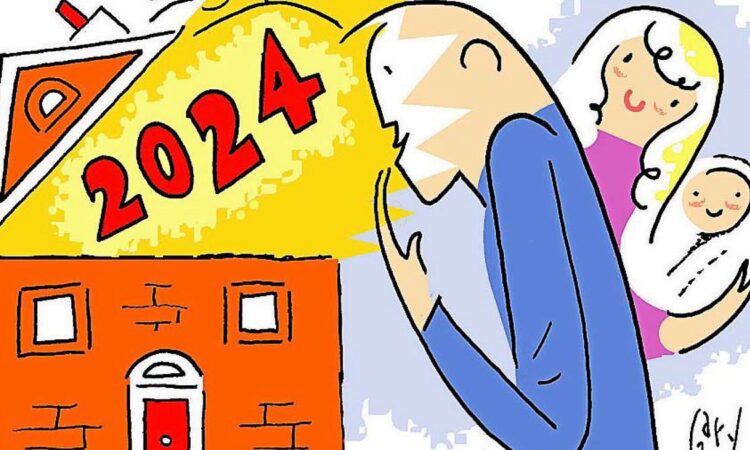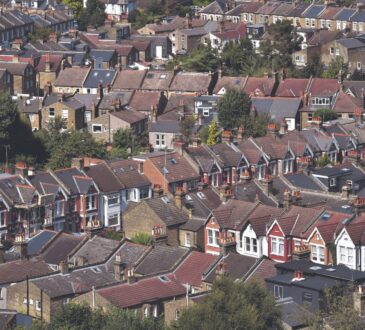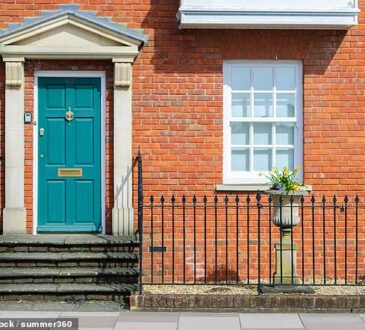How will you fare next year? After a turbulent 12 months, things could be looking up for the housing market

Whisper it quietly but with inflation falling, interest rates stabilising and house buyers not holding back as much as feared, the prospects for the 2024 housing market are much stronger than many expected just a few months ago.
The year just ending was hardly plain sailing — there’s been a 20 per cent drop in property deals, average prices have dipped and some mortgage bills more than doubled for the unluckiest borrowers.
But given the economy’s woes, it could have been so much worse.
‘There appears to be more calm and certainty heading into 2024 and the annual fall of 1.1 per cent in prices highlights the market’s much better than predicted resilience this year,’ says Tim Bannister, director of Rightmove.
So what does 2024 hold for the market overall? Forecasts range from Rightmove predicting another 1 per cent drop to the Office for Budget Responsibility, an independent Whitehall body, warning prices could fall an average of 4.7 per cent.
A middle course is steered by Zoopla which says the typical price drop in 2024 could be 2 per cent but might be less if interest rates are cut as many predict by early summer.
And what does this mean for the multiple groups involved in the housing market?
Buyers can be optimistic
These may be the big winners of 2024 as sellers price their homes competitively to secure a quick sale.
UK-wide, sellers are accepting an average discount of £18,000 off the asking price, but in London and the South East that rises to £25,000, and the savings can be even greater on some new-build homes.
Remember if you’re a cash buyer, then you’re in the strongest position of all.
Steady year for sellers
Agents advise not over-pricing to avoid the house ‘sticking’ on the market. And just because the pre-sale preparation sounds like a cliche doesn’t mean it’s not true — declutter, fix outstanding DIY jobs, maximise the property’s kerb appeal.
The good news is that most homes are selling, typically within two months of going on the market.
Mortgage swap alert
About 1.6 million mortgage deals, mostly those fixed when rates were only about 2 per cent, expire in 2024, meaning almost all those borrowers will have to fix new deals on 5 per cent or more. Ouch.
Help for first-timers
There’s much speculation that the Spring Budget will see the return of a Help To Buy scheme aimed at first timers.
The current Mortgage Guarantee Scheme, allowing FTBs to pay just 5 per cent deposit on participating properties, runs until June 2025 and many expect it to be extended. Even so, it’s tough to get on the ladder.
For example, the average deposit paid by a first timer for a £240,000 three bed home now is £34,500.
But it can be done — the agency Hamptons says 28 per cent of all flats and houses sold this year went to FTBs.
Downsizers on the up
In the year to August, 41 per cent of existing homeowners who moved house did so to something smaller, says Hamptons.
The typical downsizer who bought at least three fewer bedrooms saved 53 per cent; those who bought with one less saved 24 per cent.
Most expect downsizing to be a key housing market factor in 2024. But it’s not all profit — stamp duty, legal and agency fees and the removal costs all add up.
New costs for landlords
After a string of tax rises and stricter regulations introduced in recent years, there’s more of the same in 2024.
Capital Gains Tax exemption is slashed to just £3,000 from April, meaning landlords pay much higher taxes if they make a profit when they sell up, and the Renters Reform Bill will include tough (and expensive) minimum standards for rental properties and compulsory membership of a new tenant redress service.
Rents likely to rise
New legislation means tenant power will increase against rogue landlords and the high profile Section 21 ‘no fault’ eviction powers will be taken from landlords. But the overall shortage of homes to let means more rent rises will come.
Lettings agency Savills says average UK rents rose 9.5 per cent this year and there’s another 6 per cent hike likely in 2024.
New holiday let rules
Some councils, such as those in Greater London, limit Airbnb owners to letting for 90 nights a year at most, while the Government is considering introducing a compulsory register of all so-called ‘short lets’ to pass details to HMRC.
And some local authorities will be doubling council tax on holiday homes from April 2025.




